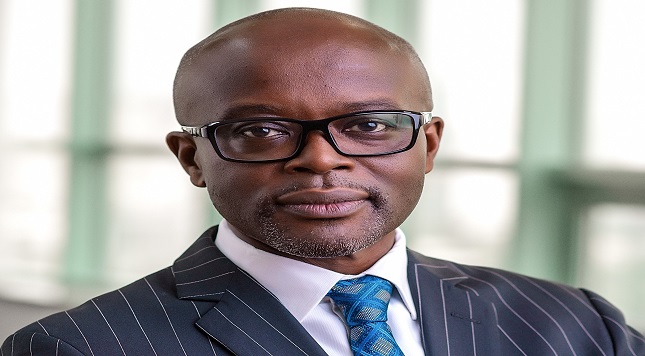General News
AnabelMobile is Simply a Smartphone-Okoye
Nicholas Okoye, managing director/chief executive officer, AnabelMobile is a consummate professional. He has experience in the finance and international capital markets and has worked with Merryl Lynch, United States of America. Okoye was also head of Strategy at the Nigerian Stock Exchange and group executive director at Transcorp and acting chief executive at Nitel for a brief period
Why AnabelMobile
There were two major issues that informed this bold step – if you look at the telecoms industry in Nigeria and of course, Africa, you will find out that there are no local players in the devices and handsets space. It is dominated by international brands and I thought there was a need for a Nigerian appeal in that particular niche of the market space. Particular of interest was once I tried to set the date and time of one of my international brand phones but could not find Nigeria on their menu but every country in the world was there. That was very annoying to me that Nigeria was not recognized by any of these brands meanwhile, they dominate in our market place and make a lot of money from Nigeria. So, I felt that the only reason that is happening is because we are not doing it ourselves and rather than going out to preach to our people on the need to design our own phones and manufacture something that is designed for us with our own embedded technologies, music, aspects that refer to us; I decided we could do it ourselves and put everything together, went out and did it! In addition to that, we decided that within the phone space, it has to be Smartphones. Smartphones are otherwise known as pocket PCs. These are phones that are able to act like computers, so they run on computer operating systems – ours run on Windows Mobile. They have central processing units (CPUs) and chips just like any other computer, and you can actually do your work on the move as if it were your office. Our phones have power point – you can programme your presentations and deliver them from the phone. They also have Excel, Word, Notes, as well as e-mail – all the office software products that you need on the PC or a laptop; you have them on your Anabel Smartphone. So, this tells us that is the future of the telecoms industry – Smartphones – and that was what we felt Africans needed to embrace because you find out that there is a lot of talk about bridging the digital divide in Africa, getting African people to understand and use information technology, but it is much more difficult to train somebody in the village who is barely literate, on how to use a computer. It is quite easy to train them on how to use a computerized phone because most of them are already using phones; they understand phones; they make both local and international calls; grandmas make and receive calls in every village right now. If I were to give grandma a Smartphone, it would be easier for me to train her on how to use it as opposed to training her to use a computer. So, I believe that the future is Smartphones and that is why we went into this business.
Windows Operating System as for AnabelMobile
Windows was chosen after a healthy debate and deep scrutiny of all the operating systems that are available to tier-one manufacturers and new manufacturers like us. We chose Windows because it is the best. That is one reason. Another is that it is the most compatible with PCs. So if you actually want your phone and your PC to be synchronized, Windows Mobile gives the best opportunity to do that because 95 percent of PCs in the world run on Windows operating system. If you want to give people an opportunity to synchronize seamlessly with their handheld devices such as Smartphones, Windows would be an ideal product to do that. Having said that, it is the best operating system; it has very interesting and unique applications which customers enjoy – the Outlook connects your e-mails seamlessly with your office, as well as connects your regular e-mails like Yahoomail and Gmail. It also allows you to do active Live Messenger from your phone. It is a very unique operating system which I think we made a good choice on, and it has Microsoft’s support. For us as new manufacturers, to use untested software system might be more of a challenge. So, that informed our choice of Windows operating system.
Cost of the Devices
There is a price range for the four models of AnabelMobile phones. We have an entry model and the more sophisticated model. The entry model would come out at a price point of about N39, 000; and a price point of about N59,000 for the more sophisticated model. Note that these are not written in stone, they might be adjusted in due course. But, we would try as much as possible to push these phones in an affordable way; we are coming at a very competitive price point. For low income earners, there is the Microfinance Bank. You spread the cost of that phone over 12 months and it comes out to less than N3,500 per month. Now most of the folks in the village who are doing business would need a computerized phone to enhance their operations because the phone is not just about making calls. It can do much more. So if somebody in the village needs to have a sophisticated work tool like this for N39,000, then the Microfinance Bank has an opportunity here and we are going to be meeting with them so that they can support these people in the village to have these kinds of tools.
Capturing Nigerian and African Market
In terms of market share, our focus mainly is the customer. We are going to be a disciplined company; we are going to listen to our customers; we are going to ask them what they want and we will endeavour to deliver on their request. Now, we are setting up a special network site called myanabel.com where citizens of the Anabel community – those who have bought our products and those who feel an affiliation with Anabel brand – can join that community and communicate to us what they think, how we can improve, what we can improve on because nobody has monopoly of ideas. Whatever the customers come up with, once it is consistent and spread across the globe, we will implement those ideas and give customers what they want. We believe that when you focus on the customers, the market share is yours for the taking. So, rather than focusing on the market share, we will focus on the customers, and what they would do is vote with their cash; they will vote with their demand and the rest becomes history. Our prospects depend solely on the customer, if the customer is unhappy with our products, then of course, we will move in a different direction. If otherwise, then our prospects are bright. It is all about what the customer wants; the prospects are tied clearly to that customer approach. We are not going to run our company like some others have done – they come up with ideas and force them down the customers’ throat. We want the customers to tell us what they want and then, we would implement them if they are worth it.
AnabelMobile Factories
We intend to actually have a factory in Nigeria in the next 3 – 4years but that would depend to a large extent on the power situation in the country. We are dealing with an international brand and we cannot be manufacturing at a loss when other international brands are doing that cost effectively. In that case, we need to make sure that the conditions for manufacturing these kinds of products are good and the power situation has been taken care of. I expect it should be taken care of in the next 3 – 4years, so we are planning in that direction.
Introducing Affordability Models
We do intend to service different segments of the market. The market segment that we are focused on now is the businesspersons, the professionals and the sophisticated students. Those aspects of the market that require phones that are little more affordable (if you will) – we would be providing phones for them. They may not necessarily be Smartphones but they would be good feature phones, and we would create features that everyone would be excited about. We have people in our research and development unit in the U.S working on such solutions as we speak, and when those solutions are ready, we will be very happy to announce to Nigerians that we have been able to crack coming up with a feature phone, with the best features in the world at the most affordable price. So, we are working on that but I cannot give you the details of that, but I can tell you that it is something that will make the Nigerian populace and customers very excited.
General News
Conoil Bonanza Winners Emerge

Conoil Plc is spreading joy this Valentine season as the first group of winners in its Valentine Bonanza promotion have been announced and rewarded. Launched on February 14, the campaign continues to delight customers at participating retail outlets.

The initial raffle draw, conducted on February 21, saw fortunate customers receive ₦10,000 worth of free petrol each. The draw was carried out publicly, with media representatives present to ensure full transparency. With the promotion still ongoing, more customers have the opportunity to join in and potentially be among the next winners.
A Conoil Management spokesperson explained that the initiative is a way to show appreciation to loyal customers for their ongoing support. “Our customers have responded impressively to the bonanza, with strong participation recorded across our stations,” the spokesperson said.
The second and final phase of the promotion is now in motion. Customers who purchase at least 10 litres of petrol at any participating Conoil station remain eligible to win in the grand finale raffle.
The grand finale is set for February 28 at 12 noon. Motorists in Lagos and Ogun states are encouraged to visit Conoil outlets to collect their tickets and take part in the exciting conclusion of this Valentine celebration.
General News
PalmPay Couples Show How Love Is Funded Digitally

PalmPay users took to the #LoveWithPalmPay campaign to show how experiences are powered through seamless banking.

It’s the month of love and social media has been filled with couples showing affection with gifts. As digital payments become embedded in everyday life, the way relationships are planned, funded, and experienced is evolving.
Recent insights from SBM Intelligence 2025 ‘Love in the Air’ report show that despite economic pressures, most Nigerians still set aside dedicated budgets for Valentine’s Day, with the largest percentage planning to spend between N51,000 and N100,000, while less than 5% are willing to spend above N500,000.
This growing intentionality highlights the need for platforms that help people manage their money more effectively, offering features like free transfers and tools that make it easier to send, track, and preserve funds while still showing up for meaningful moments.
Through the #LoveWithPalmPay campaign, PalmPay set out to show how the platform is enabling users to plan, pay, and celebrate meaningful moments with greater ease.
During the Valentine’s season, PalmPay invited couples across Nigeria to share their stories through the #LoveWithPalmPay campaign, celebrating how digital banking supports their individual expressions of love.
The campaign saw strong participation, with many PalmPay couples submitting entries that showcased how they use the app to plan surprises, pay for outings, and stay connected through everyday transactions.
From these entries, four couples were selected, each showcasing how PalmPay has enabled fast and reliable transactions in key moments.
One video from @simply.omotoshan, one of the selected couples, captures the role of seamless payments in making their spontaneous moments possible.
She said in her entry video: “Our cutest money moment with PalmPay was when we planned our Valentine’s picnic and realized we had forgotten half of the things we needed; literally, half of everything. We rushed to the mall to get cakes, food, decorations, and all the essentials. When it was time to pay, we used PalmPay.
“The transaction was smooth, fast, and stress-free. In no time, we were done setting up our Valentine-themed picnic with everything perfectly ready. Honestly, all our experiences with PalmPay have been easy and satisfying, but this one is definitely our cutest money moment. Thank you, PalmPay.”
A testimonial from the fourth selected couple, Mohammed and his wife, reflects his excitement: “Hello PalmPay, thank you so much for selecting us as one of the winners of the #LoveWithPalmPay campaign. We truly appreciate this. My wife and I are very grateful. Thank you, PalmPay, for the love and support. We’re so happy and thankful for the N100,000 reward. We love you, PalmPay, and long live PalmPay. Thank you so much.”
Beyond the feel-good stories, the campaign reflects a broader shift: fintech is no longer just about transactions, it’s about enabling experiences. Reliable payments, fast transactions, and accessible financial tools reduce the friction that can disrupt important moments, allowing users to focus on connection rather than logistics.
From paying for dinner to managing other expenses, PalmPay continues to demonstrate how digital financial services support modern relationships, proving that in today’s economy, love is not only felt, it’s funded digitally.
General News
KPMG Strengthens Africa Leadership to Support Long‑term Growth Across the Continent

KPMG has appointed Tola Adeyemi as Chief Executive Officer for KPMG one Africa, alongside the addition of Professor Olayinka David‑West and Dr. George Njenga as independent members of the Africa Governance Council (AGC).

Effective from March 2026, the appointments reinforce the firm’s leadership expertise, underscore a long‑term commitment to Africa and highlight confidence in the continent’s growth potential.
“Africa is one of the most dynamic and promising regions in the global economy, and KPMG is committed to playing a meaningful role in its growth story,” said Tola Adeyemi, incoming CEO for KPMG One Africa.
He continued: “It is a privilege to step into this role at such a pivotal moment for both KPMG and the continent. I look forward to building on our strong, connected and high‑performing base to deepen collaboration and deliver consistent quality and impact across our markets.”
KPMG is recognised globally for its commitment to quality, integrity and professional excellence, supported by a strong global network of member firms. Trust remains the foundation of the audit and accounting profession, with high standards of governance, ethics and audit quality increasingly demanded across Africa’s public and private sectors.
KPMG One Africa’s approach brings the continent closer together with strong leadership to strengthen cross-border collaboration and offer shared expertise and consistency which is business‑critical to help clients navigate complex risks and unlock sustainable growth opportunities.
Commenting on the appointment, Professor Ben Marx, Chairman of the Africa Governance Council, said: “Tola Adeyemi is exceptionally well positioned to lead KPMG One Africa. In addition to his global perspective as a member of the KPMG Global Council, he brings significant influence and credibility as a respected business leader across the continent.”
The appointments of Professor David‑West and Dr Njenga to the Africa Governance Council, which provides board level governance, further strengthens independent oversight, bringing strong academic credentials alongside deep strategic and business expertise.
“These appointments reinforce KPMG’s commitment to strong governance, accountability and leadership depth,” Marx added. “They complement our established African leadership team, in‑country managing partners and regional senior partners, further enhancing our client‑centric approach across Africa.”

 E-Business3 days ago
E-Business3 days agoAfDB, UNDP Launch $10Bn AI Initiative for Africa

 Telecom3 days ago
Telecom3 days agoGrey Expands Cross-Border Banking with USD Accounts, USDC Support

 General News2 days ago
General News2 days agoKPMG Strengthens Africa Leadership to Support Long‑term Growth Across the Continent

 News3 days ago
News3 days agoDG NITDA Reaffirms FG Commitment to Responsible, Inclusive AI

 News3 days ago
News3 days agoLotus Bank, REA Seal N100Bn Deal to Power Rural Nigeria

 E-Financial3 days ago
E-Financial3 days agoCBN Cuts MPR by 50bps to 26.50% as Inflation Eases for 11th Month

 E-Financial3 days ago
E-Financial3 days agoKuda Bank Teams Up with Lovers & Frnds for Inclusive Valentine’s R&B Bash

 General News3 days ago
General News3 days agoKaspersky Enhances Network Detection and Response Capabilities with KATA 8.0 Release














